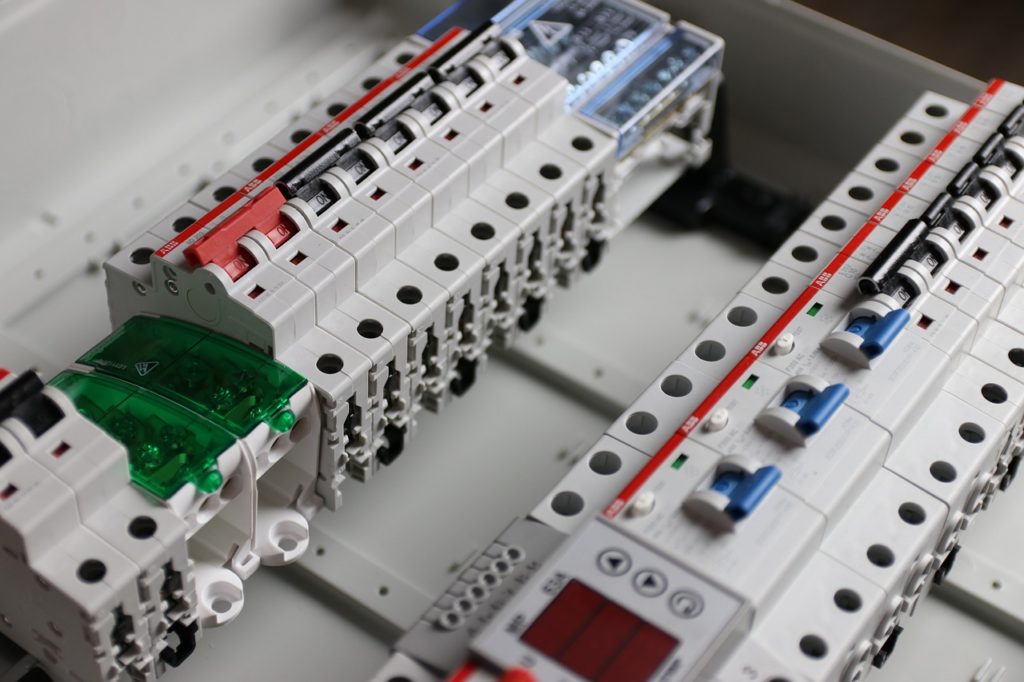GFCI, a ground fault circuit interrupter, is a device that can detect an electrical fault and shut off power before an injury or electrocution happens. It will “sense” the difference between the amount of electricity flowing into the circuit and the one flowing out, and react within one-tenth of a second to trip or shut off the circuit.

Generally, this is where GFCIs are generally required to be installed in your home or office:
The general rule is that GFCI is required wherever electrical circuits may accidentally come into contact with water; basically where appliances and power tools are used in close proximity to water.
It is recommended that GFCIs be installed in kitchens, baths, restrooms, laundry rooms, outdoors, or in the garages where electric power tools might be used.
While some appliances have built-in GFCI protection, such as hair dryers, there are still many appliances not equipped with GFCI.
There are three types of GFCIs, the most often used one being the “receptacle-type”, similar to a common wall outlet.
The National Electrical Code requires GFCI receptacles to be installed in bathrooms, garages, spa areas, and outdoors. The GFCI circuit breaker provides protection against overloads, short circuits and ground faults by detecting very low levels of electrical current leaks and quickly shutting off power, preventing serious shock.
A GFCI receptacle can be installed at an individual power outlet, or, a GFCI breaker can be used in the electrical panel to provide GFCI protection for all outlets powered by that breaker. Whenever you see power outlets with the test and reset buttons, it’s the faceplate of a GFCI receptacle, the receptacle itself being the electrical unit inside the wall. Whatever you plug into a GFCI receptacle will shut off if the unit detects a problem, and any power outlets connected further down the same line will also lose power in case of an electrical problem.
Generally speaking, GFCI receptacles should be used when:
- A circuit powers some receptacles that need GFCI protection and some that don’t
- A receptacle is located far away from the panel box
- You need few GFCI outlets and don’t want the expense of a high-quality GFCI breaker
Circuit breaker GFCIs are used as replacements for standard circuit breakers and provide GFCI protection to all receptacles on that individual circuit. The GFCI breaker can be built into or added onto your electrical panel and is typically a little larger and has its own test and reset buttons.
An entire circuit with a GFCI breaker can be used when:
- Most or all outlets on a circuit need GFCI protection
- Some outlet locations lack the space for bulky GFCI receptacles
- You simply prefer the greater protection of the entire circuit
- Specialty uses require a GFCI breaker, such as heated swimming pools
- Operating a GFCI Breaker or Receptacle
Temporary or portable GFCIs are often used in construction and in outdoor settings with electric tools, mowers, trimmers, and similar devices; they are not to be used as a permanent alternative to a regular GFCI and should be tested prior to every use.
Installing a new GFCI breaker or receptacle is a fairly simple electrical project that still requires adequate knowledge of electrical wiring and safety practices; however, if incorrectly installed, a GFCI device may fail to provide protection and significant, even fatal, injury may occur.
In order to ensure that the system can successfully detect an electrical problem, monthly GFCI tests are recommended. This can be done by plugging in an appliance, turning it on, and pressing the test button – the power should shut off and then you can press the reset button. You can test every outlet connected to the circuit.
Denny’s Electric Service has the experience and knowledge to install the best whole-house surge protection possible to keep your electricity uninterrupted and defend your home from unwanted surges.
It’s highly recommended to contact a licensed electrician to assist with replacing damaged components and configuring other electrical problems, especially since damage can occur even if your circuit breaker trips.
At Denny’s Electric Service, as a full service residential electrical contractor, we pride ourselves on being committed to delivering not only quality workmanship and superior service, but also making sure you and your loved ones are safe in your home.
Your search for a reliable and skilled residential electrician in southeastern Pennsylvania ends right here – contact Denny’s Electric Service today to learn more about ground fault circuit interrupters and receive quality electrical services.

